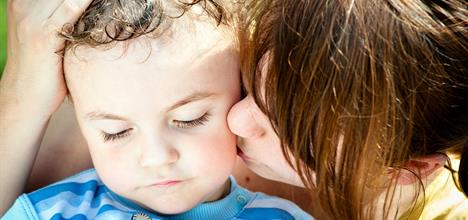Can You Tell if a Baby Is Going to Be Autistic
What are the Early Signs of Autism?


Page Content
Many children with autism spectrum disorder (ASD) show developmental differences when they are babies—especially in their social and language skills. Because they usually sit, crawl, and walk on time, less obvious differences in the development of body gestures, pretend play, and social language ofttimes get unnoticed.
In addition to speech/linguistic communication delays and behavioral differences, families may find differences in the way their child interacts with peers and others.
Recognizing signs of autism
Here are some examples of social, communication, and behavioral differences in children with autism.
Continue in mind: 1 child with ASD volition not take exactly the aforementioned symptoms equally some other kid with ASD. The number and severity of symptoms tin vary a lot!
Social differences in children with autism
-
May not keep middle contact or makes little or no heart contact
-
Shows no or less response to a parent's grin or other facial expressions
-
May not look at objects or events a parent is looking at or pointing to
-
May non point to objects or events to become a parent to expect at them
-
Less probable to bring objects of personal interest to show to a parent
-
Many non have appropriate facial expressions
-
Has difficulty perceiving what others might be thinking or feeling past looking at their facial expressions
-
Less likely to show concern (empathy) for others
-
Has difficulty making and keeping friends
Communication differences in children with autism
-
Less likely to signal at things to betoken needs or share things with others
-
Says no single words by 15 months or 2-discussion phrases by 24 months
-
Repeats exactly what others say without understanding the meaning (frequently called parroting or echoing)
-
May not respond to name being chosen only does answer to other sounds (like a automobile horn or a true cat's meow)
-
May refers to self as "yous" and others as "I" and may mix up pronouns
-
May show no or less interest in communicating
-
Less probable to offset or continue a chat
-
Less likely to use toys or other objects to stand for people or existent life in pretend play
-
May accept a good rote memory, specially for numbers, letters, songs, Television receiver jingles, or a specific topic
-
May lose linguistic communication or other social milestones, usually between the ages of 15 and 24 months (oftentimes called regression)
Behavioral differences (repetitive & obsessive behaviors) in children with autism
-
Rocks, spins, sways, twirls fingers, walks on toes for a long time, or flaps hands (called "stereotypic beliefs" or stereotypies)
-
Likes routines, order, and rituals; has difficulty with change or transition from one activity to another
-
May be obsessed with a few or unusual activities, doing them repeatedly during the twenty-four hours
-
Plays with parts of toys instead of the whole toy (e.g., spinning the wheels of a toy truck)
-
May not cry if in hurting or seem to accept whatsoever fear
-
May be very sensitive or not sensitive at all to smells, sounds, lights, textures, and touch
-
May accept unusual use of vision or gaze—looks at objects from unusual angles
Parents: trust your instinctsIf you take concerns about how your kid plays, learns, speaks, acts, or moves, talk with your pediatrician. Before y'all go to the appointment, complete a free developmental milestone checklist, and read these tips about "How to Talk with the Doctor." Remember, yous know your child best and your concerns are of import. Together, you and your pediatrician will find the all-time manner to help your child. If you're uneasy virtually the dr.'south communication, seek a second opinion. Don't wait. Interim early can make a large departure in your child'south development! |
|---|
How to distinguish a child with autism from other typically developing children
Hither are some examples that may help a parent tell the difference betwixt normal, age-appropriate beliefs and early on signs of ASD. Too come across When Not to Worry Nigh Autism.
At 12 Months
-
A child with typical development will turn their caput when they hear their name.
-
A child with ASD might non turn to look, even after their name is repeated several times, but volition respond to other sounds.
At xviii Months
-
A child with delayed voice communication skills will betoken, gesture, or use facial expressions to make up for their lack of talking.
-
A kid with ASD might make no effort to recoup for delayed speech or might limit speech to repeating what they hear on TV or what they just heard.
At 24 Months
-
A child with typical development brings a flick to show their female parent and shares their joy from information technology with her.
-
A child with ASD might bring their mom canteen of bubbles to open, but they do not look at her face when they do or share in the pleasance of playing together.
More data
- How Pediatricians Screen for Autism
- Milestones Matter: 10 to Watch for past Age 5
- How to Heighten Concerns about a Child'due south Spoken communication and Language
- What is Early Intervention?
- Language Delays In Toddlers: Information for Parents
- Acquire the Signs. Deed Early (CDC.gov) - Aims to improve early on identification of children with autism and other developmental disabilities so children and families can get the services and support they need.
Article Body
- Terminal Updated
- 4/1/2021
- Source
- American Academy of Pediatrics (Copyright © 2021)
The information contained on this Web site should non be used equally a substitute for the medical care and communication of your pediatrician. There may exist variations in treatment that your pediatrician may recommend based on private facts and circumstances.
Source: https://www.healthychildren.org/English/health-issues/conditions/Autism/Pages/Early-Signs-of-Autism-Spectrum-Disorders.aspx
0 Response to "Can You Tell if a Baby Is Going to Be Autistic"
ارسال یک نظر